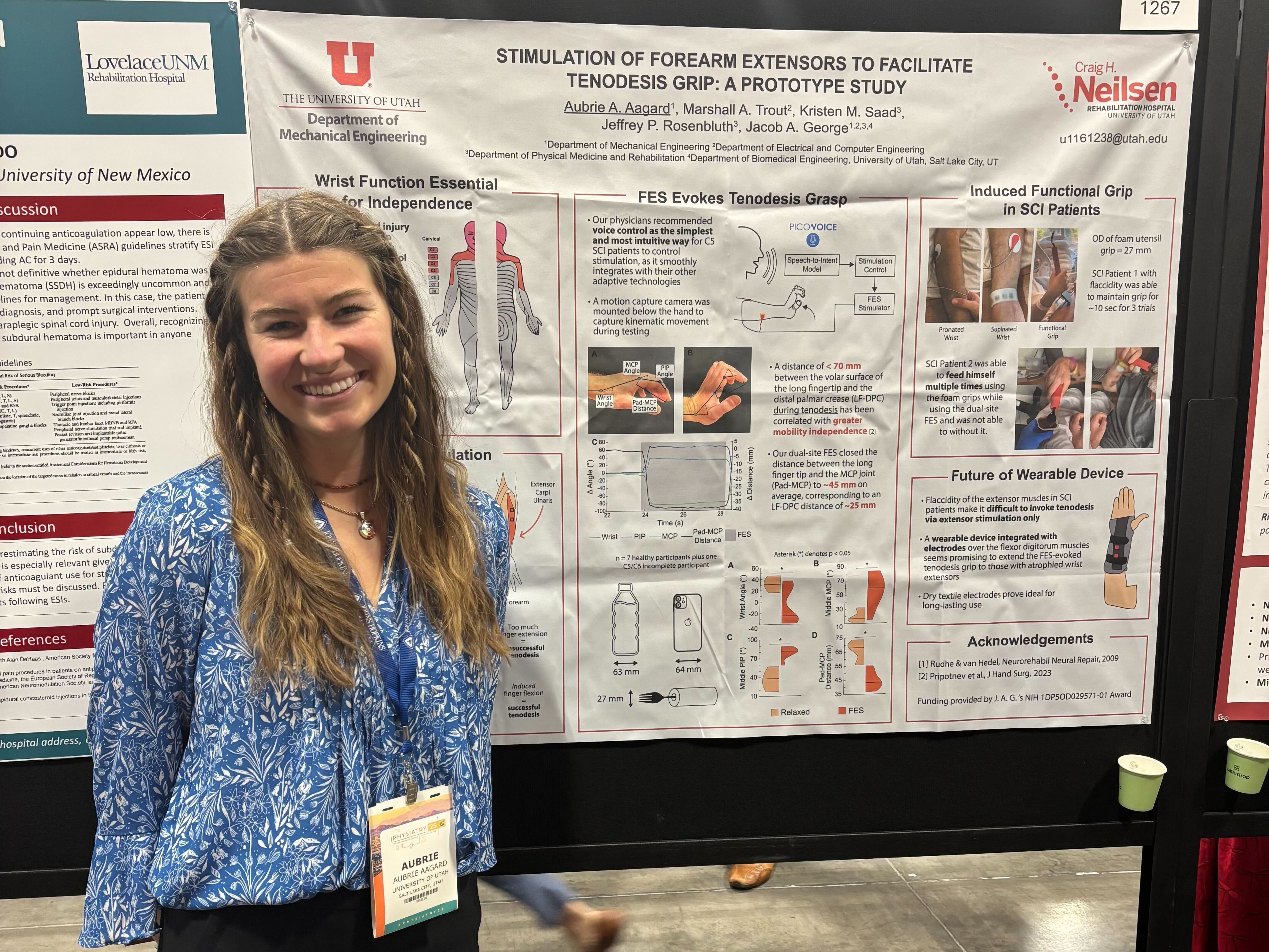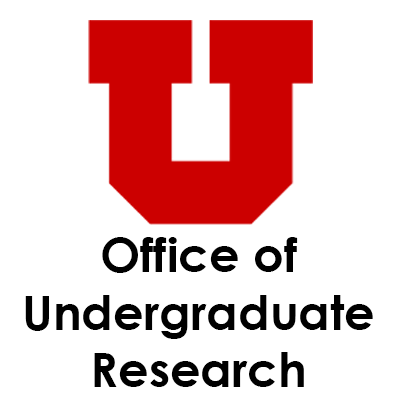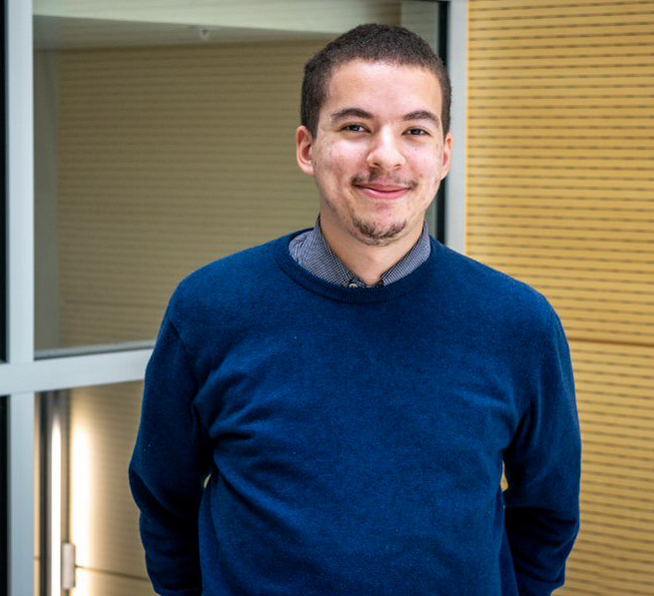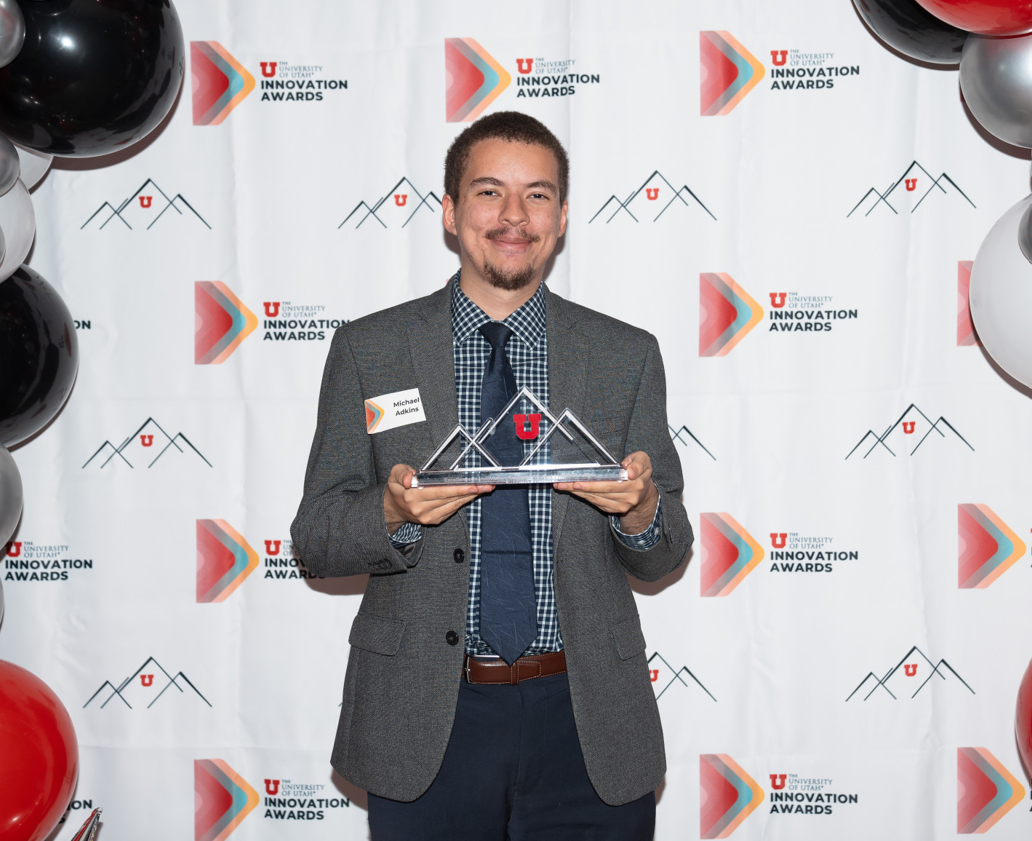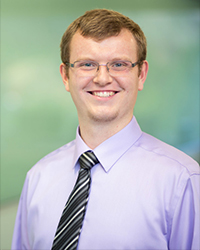Congratulations to Troy on successfully completing his PhD defense — a huge milestone and the culmination of years of focused work. We’re proud to celebrate this accomplishment and excited to see what he does next.
Connor, Monika, & Abby pass Ph.D. Research Proposals!
Congrats to three of our Ph.D. students for passing their Research Proposals! This two-part milestone requires a written and oral presentation of the student’s dissertation plan. Students must demonstrate adequate preparation to begin independent research per their supervisory committee. They must be well-versed in the fundamentals, have sophisticated familiarity with the primary literature in the proposed area of research, and demonstrate an ability to design and effectively communicate a competent, sound research plan.
Congrats, Connor, Monika, and Abby, on completing this major milestone!
Connor Olsen, Electrical and Computer Engineering: “Optimizing Electrode-Skin Interfaces and Evaluation Metrics to Improve Myoelectric Prosthetic Use”
Monika Buczak, Biomedical Engineering: “Intuitive, Myoelectric Control of Assistive Devices”
Abby Harrison, Biomedical Engineering: “Leveraging Transcutaneous Stimulation to Provide Sensory Feedback after Limb Amputation”



Aubrie Aagard’s Outstanding Presentation on Neurorobotics and FES at the AAP Conference
Aubrie Aagard delivered an insightful presentation at the Association for Academic Physiatrists Annual Conference, showcasing how neurorobotics and FES can be effectively translated into clinical practice to improve patient outcomes.


UROP Awards for Spring 2025
Huge congratulations to Ava Lloyd, Luke Jones, and Lily Nygard for their UROP Proposals being accepted and funded for the Spring 2025 semester! The Utah Undergraduate Research Program (UROP) funds students for up to two semesters of research. Each of these students submitted a project proposal under the direction of graduate and faculty mentors.
Ava is working in collaboration with an OT in the NRH to develop a walking aid for patients to use with parallel bars during gait rehabilitation.
Luke is working with MDs in the Emergency Medicine department to develop a sensorized glove to detect and prevent frostbite.
Lily is working to investigate the effects of electrical stimulation on upper-limb spasticity after a stroke!
Michael Adkins Passes Thesis Proposal
Congratulations to Michael Adkins for passing his Electrical Engineering thesis proposal! Michael Adkins developed the Electronic Grip Gauge (EGG), a new kind of device to help assess and rehabilitate the hand function of those with neurological deficits. Michael’s PhD research will focus on using this device with hemiparetic stroke patients to determine its efficacy as an assessment and rehabilitation tool.
Michael Adkins Receives 2024 “Excellence in Innovation Graduate Student” Award
Congratulations to Michael Adkins on being awarded the University of Utah’s 2024 “Excellence in Innovation Graduate Student” Award at this years Innovation Awards. Michael Adkins was the sole awardee of this years award which recognizes a graduate student who has had an exceptional commitment to the development and translation of new technologies, devices, and innovations.
https://technologylicensing.utah.edu/news-events/university-of-utah-announces-2024-innovation-awards-recipients
“Michael Adkins exemplifies the intersection of clinical, business, engineering and scientific innovation. A standout M.D.-Ph.D. student in the Utah NeuroRobotics Lab, Adkins has earned multiple accolades, including an NIH diversity fellowship, a $50,000 NSF I-Corp grant, and $51,000 in business competition awards. His research has led to patents and multiple research articles, is not only scientifically rigorous but also demonstrates commercial viability and immediate clinical impact. Adkins’s ability to immerse himself in customer discovery and entrepreneurial competitions while developing groundbreaking technologies positions him as a rising leader in healthcare innovation.”

Michael Adkins Selected to Advise the NIH NICHD Professional Development Planning Group
Congrats to Michael Adkins for being selected as one of three advisors for the NIH NICHD professional develop planning group. Michael will be advising NIH program staff on professional development programs, info sessions, and workshops for trainees in biomedical research. Through this unique experience he will network directly with NIH program officers, gain exposure to NIH processes, opportunities, and careers, and enhance the way NIH supports trainees. Congrats Michael!
New publication in the Journal of Neural Engineering
A paper led by Caleb Thomson was recently published in the Journal of Neural Engineering. The paper is titled: “Enhancing neuroprosthesis calibration: the advantage of integrating prior training over exclusive use of new data” and was coauthored by Troy N Tully, Eric S Stone, Christian B Morrell, Erik J Scheme, David J Warren, Douglas T Hutchinson, Gregory A Clark and Jacob A George.
Clay Stanley awarded the NIH fellowship
University of Utah Electrical engineering Ph.D. student Clay Stanley received a $144,000 two-year fellowship from the National Institute of Health for individuals with a disability. These funds will support Stanley as he continues his research on non-invasive transcutaneous functional electrical stimulation.
Stanley learned about the NeuroRobotics lab from the family member of a previous inpatient of the Neilsen Rehabilitation Hospital (NRH), where the NeuroRobotics lab is located. The lab is run by assistant professor Jacob George, who mentors dozens of students on projects for neurorobotic technology. The majority of these projects focus on the advancement of rehabilitation technology for amputees, stroke, and spinal cord injury survivors.
After a traumatic spinal cord injury (SCI) in 2011, Stanley credits improvements in his recovery to extensive physical and occupational therapy research programs established by the NeuroRecovery Network (NRN). In 2015, he participated in an NRN program that used an FES algorithm with positive results on SCI patient rehabilitation outcomes.
One of the senior Ph.D. students in the lab, Marshall Trout, has worked on the development of new FES technology as one of his research aims. Stanley has continued the work of one of these projects that deals with the use of a multi-electrode stimulator to activate the paretic hand of individuals with neurological impairments of the upper extremity.
Modern FES systems can activate paretic muscles, however there is difficulty in activating the muscles in a way that can help patients make functional movements. The two years of funds from the NIH can support Stanley as he pursues his research aim of improving FES therapy for rehabilitation. His goal is to improve FES devices to better assist patients in rehabilitation with more effective hardware, software, and algorithm designs.
Utah Neurorobotics Lab members win proposal grant at the RAC Grand Challenge
The Utah Neurorobotics Lab won a $100,000 grant from the Remote and Austere Conditions Grand Challenge, presented by the University of Utah’s Office of the Vice President for Research. The RAC Grand Challenge was created “as a pioneering initiative to stimulate and support innovative research focused on developing new techniques, technologies, and methods for remote and austere environments”, intending to “drive advancements and societal impact that address the unique challenges of these environments.”
Our proposal was titled “FrostByte: A Wearable Temperature Monitoring System for Frostbite Prevention and Research.” The project leverages a prototype wearable glove developed by our lab to monitor and prevent frostbite. The current device consists of a simple glove liner with a few thermocouples wired to a heating element to activate in case of extreme temperatures, but this simple device could have a big impact on clinical care. 1 in 10 people who live in cold climates get frostbite at some point in their life, and that number gets as high as 1 in 3 for those who recreate in the cold. 30% of frostbite cases result in amputation.
Under principal investigators Jacob George, PhD, and Scott McIntosh, MD, a team of MDs and PhDs were assisted by lab members Connor Olsen and Sophie Nelson. Congratulations team!
You can find more information on the RAC Grand Challenge here.



